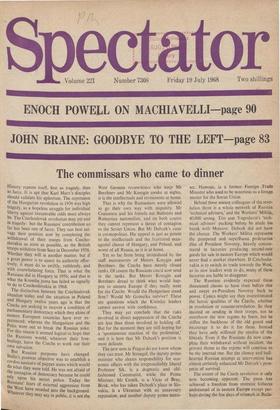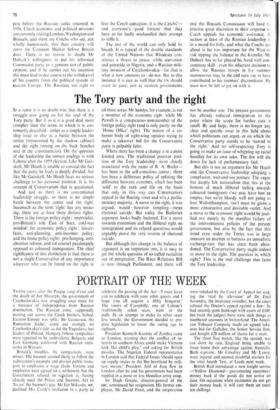The commissars who came to dinner
History repeats itself, first as tragedy, then as farce. It is apt that Karl Marx's disciples should validate his aphorism. The repression of the Hungarian revolution in 1956 was high tragedy, as a hopeless struggle for individual liberty against insuperable odds must always be. The Czechoslovak revolution may yet end in tragedy : but the Russians' contribution so far has been one of farce. They can best sal- vage their position now by completing the withdrawal of their troops from Czecho- slovakia as soon as possible, as the British troops withdrew from Suez in December 1956. Whether they will is another matter; but if a great power is to assert its authority effec- tively, it must do so swiftly, ruthlessly, and with overwhelming force. That is what the Russians did in Hungary in 1956; and that is what the Kremlin junta has failed so signally to do in Czechoslovakia in 1968. The distinction between the Czechoslovak situation today and the situation in Poland and Hungary twelve years ago is that the Czechs are seeking to recover a condition of parliamentary democracy which they alone of eastern European countries have ever ex- perienced; whereas the Hungarians and the Poles were out to break the Russian yoke. For this reason it seemed logical to hope that the Russians would, whatever their fore- bodings, leave the Czechs to work out their own salvation. But Russian purposes have changed. Stalin's postwar objective was to establish a cordon sanitaire of puppet states which would do what they were told. He was not afraid of the contagion of democracy because he could rely upon his secret police. Today the Russians' fears of external aggression from the West have receded into the background. Whatever they may say in public, it is not the West German revanchistes who keep Mr Brezhnev and Mr Kosygin awake at nights, it is the intellectuals and revisionists at home.
That is why the Rumanians were allowed to go their own way with impunity. Mr Ceausescu and his friends are Stalinists and Rumanian nationalists, and on both counts they cannot represent a threat of contagion to the Soviet Union. But Mr Dubcek's virus is cosmopolitan. His appeal is just as potent to the intellectuals and the frustrated man- agerial classes of Hungary, and Poland, and worst of all Russia, as it is at home.
Yet so far from being intimidated by the staff manoeuvres of Messrs Kosygin and Brezhnev, the Czechs have merely closed ranks. Of course the Russians could now send in the tanks. But Messrs Kosygin and Brezhnev dread to think what would hap- pen to eastern Europe if they really went for the Czechs. Would the Hungarians stand firm? Would Mr Gomulka survive? These are questions which the Kremlin leaders cannot answer with confidence.
They may yet conclude that the risks involved in direct suppression of the Czechs are less than those involved in holding off. But for the moment they are still hoping for a 'spontaneous reaction of the proletariat.' and it is here that Mr Dubcek's position is most delicate.
The new men in Prague do not know whom they can trust. Mr Strougal, the deputy prime minister who shares responsibility for eco- nomic affairs with the irreproachably liberal Professor Sik, is a dogmatic and old- fashioned Communist, while the Prime Minister, Mr Cernik, is a Vicar of Bray. Birak, who has taken Dubcek's place in Slo- vakia, is a Ukranian with an unsavoury reputation; and another deputy prime minis- ter, Humour, is a former Foreign Trade Minister who used to be notorious as a forage master for the Soviet Union.
Behind these uneasy colleagues of the revo- lution there is a whole network of Russian 'technical advisers,' and the Workers' Militia, 40,000 strong. Tito sent Yugoslavia's 'tech- nical advisers' packing before he made his break with Moscow: Dubcek did not have the chance. The Workers' Militia represents the pampered and superfluous proletarian elite of President Novotny, heavily concen- trated in factories producing second-rate goods for sale in eastern Europe which would never find a market elsewhere. 11 Czechoslo- vakia is to switch its trade towards the West, as its new leaders wish to do, many of these factories are liable to disappear.
The Russians evidently expected these threatened classes to have risen before this and swept ex-President Novotny back to power. Cynics might say they overestimated the heroic qualities of the Czechs, whether in revolution or counter-revolution. So they insisted on sending in their troops, not to overthrow the new regime by force, but to stiffen the backbone of the old guard and encourage it to do it for them. Instead they have only stiffened the resolve of the liberals. Even if the Russians do now com- plete their withdrawal without incident, the gravest threat to the regime will continue to be the internal one. But the clumsy and half- hearted Russian attempt at intervention has almost certainly enhanced Mr Dubcek's pros- pects of survival.
The extent of the Czech revolution is only now becoming apparent. The press has achieved a freedom from restraint hitherto undreamed of in eastern Europe except per- haps during the few days of triumph in Buda- pest before the Russian tanks returned in 1956. Czech economic and political missions are currently visiting London, Washington and Brussels, and there are Czechs who say..nt wholly humorously, that their country will enter the Common Market before Britain does. There is no reason to doubt Mr Dubcek's willingness to put his reformed Communist party to a genuine test of public opinion, and if he carries out his intention this must lead in due course to the withdrawal of his country from the political system of eastern Europe. The Russians are right to fear the Czech contagion; it is the Czechs'— and everyone's—good fortune that they have so far badly mishandled their attempt to stifle it.
The rest of the world can only hold its breath. It is typical of the double standards of the United Nations that Rhodesia con- stitutes a threat to peace, while starvation and genocide in Nigeria, and a Russian mili- tary invasion of Czechoslovakia—for that is what it now amounts to—do not. But in this instance it is just as well that the UN should avert its gaze, just as western governments and the Brussels Commission will have to practise great discretion in their response to Czech appeals for economic assistance. A section at least of the Russian leadership in a mood for folly, and what the Czechs are about is far too important for the West to risk tipping the balance in the Kremlin. Mr Dubcek has so far played his hand with con- summate skill—even his reluctant decision to allow the Russian troops in for summer manoeuvres may in the end turn out to have contributed to his enemies' discomfiture. He must now be left to get on with it.







































